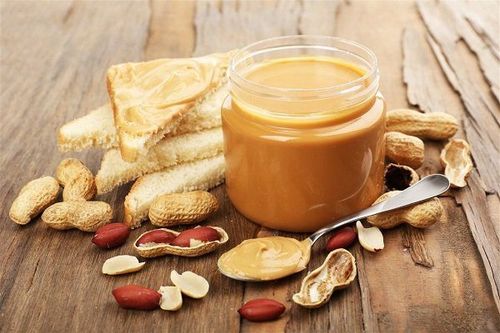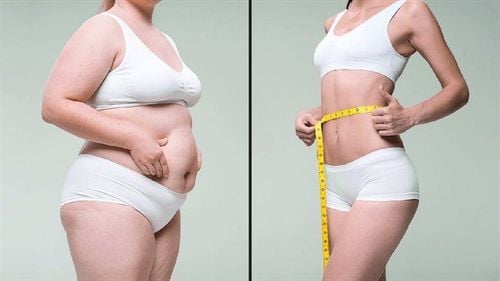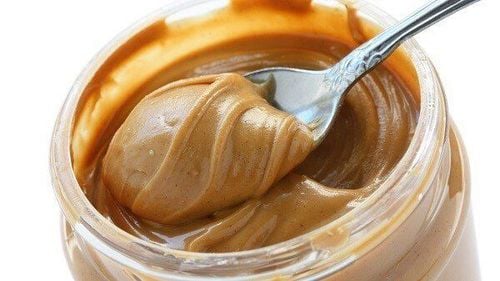This is an automatically translated article.
Delicious and versatile peanut butter. It is rich in nutrients and goes well with both savory and sweet foods. While some claim that the high calorie and fat content can lead to weight gain, others say that peanut butter's high protein dosage can help with weight control. This article provides detailed information about this food.
1. Nutritional composition of peanut butter
Peanut butter is packed with healthy fats, protein, fiber and a variety of essential vitamins and minerals. The nutrients in peanut butter can aid in weight loss, as the best diet includes: A variety of nutrient-rich foods to fully meet your dietary needs.
A serving of about 32 grams of peanut butter provides: Calories: 188 kcal; Fat: 16 grams; Saturated fat: 3 grams; Carbs: 7 grams; Fiber: 3 grams; Protein: 8 grams; Manganese: 29% of the reference daily intake (RDI); Magnesium: 13% of the RDI; Phosphorus: 10% of the RDI; Potassium: 7% RDI, Vitamin E: 10% RDI; Vitamin B3 (niacin): 22% of the RDI; Vitamin B6: 7% of the RDI; Vitamin B9 (folate): 7% of the RDI.
Notably, the majority of peanut butter's calories consist of unsaturated fats. Research indicates that replacing saturated fats in your diet with unsaturated fats can lower your cholesterol levels and overall heart disease risk.
One serving of peanut butter provides about 10% of your recommended daily fiber needs.
2. Benefits of peanut butter
2.1. Peanut butter can help reduce cravings Eating peanut butter can help you lose weight because the ingredients in peanut butter have the ability to reduce cravings. In a study that included up to three meals of 15 obese women, who added 42.5 grams (about 3 tablespoons) of peanut butter to their breakfast. And as a result, they felt fuller and wanted to eat less than the control group. However, additional research on the specific role of peanut butter in appetite suppression is limited.
Several studies have linked the consumption of peanuts and nuts with the ability to boost metabolism in a way that aids weight control.
2.2. Protein in peanut butter helps promote satiety and reduce fat About 17% of calories in peanut butter come from protein - a 2-tbsp (32-gram) serving provides about 8 grams.
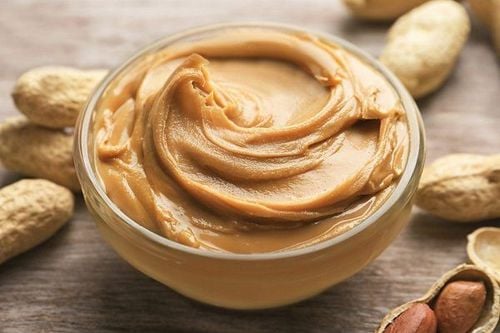
Protein trong bơ đậu phộng có thể làm tăng cảm giác no của người dùng
Research shows that consuming enough protein can increase feelings of fullness, potentially reducing your desire to keep eating. In turn, this can help you promote weight loss more effectively. Furthermore, eating enough protein is also important in maintaining muscle mass during weight loss, as muscle is important for maintaining your strength. Your metabolism slows down if you lose too much muscle, making it harder to keep losing weight.
Protein-rich foods, such as: Peanut butter... Using high-protein foods in a reduced-calorie diet can promote more fat loss than the same diet without not enough protein.
2.3. Can peanut butter help maintain weight? Eating peanuts will help you lose weight or not? Although peanuts are part of a high-fat, high-calorie food, they are not associated with weight gain as you might expect.
In fact, most of the available research indicates that diets rich in peanuts and nuts may be more effective in supporting weight maintenance than diets that eliminate peanut butter from the diet. . Furthermore, people who regularly ate peanuts and peanut butter tended to have a lower BMI than those who didn't. However, the exact reason why peanuts aid in weight maintenance is unclear.
Because the calorie content of nuts provided to the body may not be completely absorbed, they may not lead to an excess of calories supplied to the body but on the contrary will cause weight gain.
Finally, more research is still needed to better understand the role peanuts and peanut butter play in weight management.
2.4. Peanut butter is quite concentrated in calories One of the main reasons that dieters avoid peanut butter is because of the high calorie and fat content in this food. Peanut butter packs a punch, providing nearly 200 calories per 2-tablespoon (32-gram) serving. What's more, more than 75% of those calories come from fat.
When you use more calories than you use to burn your body's daily activities, weight gain can occur. This is why calorie control is considered one of the cornerstones of almost any weight loss diet.
However, you should consider more than just calories when deciding what foods to include in your diet. Peanut butter also provides protein, fiber, vitamins, minerals, and antioxidants - all of which promote health. Because peanut butter provides high-quality calories and is also quite nutritious, 200 calories of peanut butter will have a more positive impact on health than 200 calories of a processed diet food.
Of course, this doesn't mean you can eat all the peanut butter you want. If you start eating too much peanut butter without taking into account the extra calories, you could be hindering your weight loss efforts. As with any other food, moderation is the key to effective weight management.
You can eat vegan peanut butter along with other nutritious foods in a healthy diet, as long as you don't exceed your calorie needs.
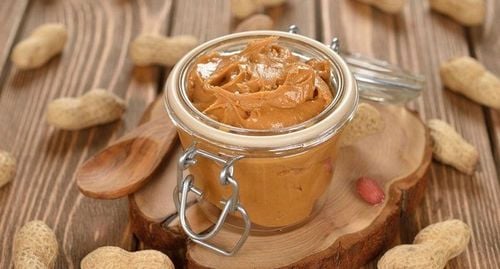
Bơ đậu phộng có hàm lượng calo và chất béo khá cao
3. How to use peanut butter healthy
Peanut butter can be incorporated into a healthy diet to aid in weight loss. Not all peanut butters are created equal. While peanut butter in its most natural form is healthy, many commercially processed forms are full of additives, such as sugar and hydrogenated oils, which may contain trans fats.
When choosing peanut butter, check the label to make sure it doesn't contain additional ingredients. The only thing that peanut butter consists of is peanuts. Salt can also be safely added to peanut butter for extra flavor.
Usually, the oil in natural peanut butter - the one without additives - can separate, floating to the top of the jar, but this is not a cause for concern. After opening the vial, just mix it. After that, you can put this mixture in the refrigerator to prevent it from separating.
Healthy ways to incorporate peanut butter into your diet:
If you want to lose weight without giving up peanut butter, you can: measure portion sizes to help you keep track of your peanut butter intake you are consuming. This way, you can make sure you're sticking to your calorie or macronutrient goals. Or you may also have to cut out another food to maintain the parameters of your diet plan. For example, you might opt to replace peanut butter with a less nutritious spread on toast, such as jelly or butter. Or, instead of sugaring your fruit slices, try peanut butter.
Other ways to eat peanut butter include: Spread peanut butter on rice cakes or crackers, use peanut butter with popcorn, Use peanut butter to dip with celery or carrots, Stir in peanut butter peanuts in yogurt or oatmeal. Remember, peanut butter alone will not help your weight loss progress. Weight management is complex and requires a multidimensional approach. You will have to make some adjustments to a healthy diet and lifestyle to be effective.
Although this is considered a fairly nutritious food, peanut butter is sometimes avoided due to its high fat and calorie content. However, peanut butter can help promote weight loss, prolong satiety, and reduce cravings. While its calories mostly come from fat, its fat has health benefits. It's also chock-full of other important nutrients, including protein, fiber, vitamins, and minerals. While peanut butter certainly has an important place in a healthy weight loss diet, you may need to keep an eye on your calories and macronutrients to stay on track and reach your goals. his health.
Please dial HOTLINE for more information or register for an appointment HERE. Download MyVinmec app to make appointments faster and to manage your bookings easily.
Reference source: healthline.com





